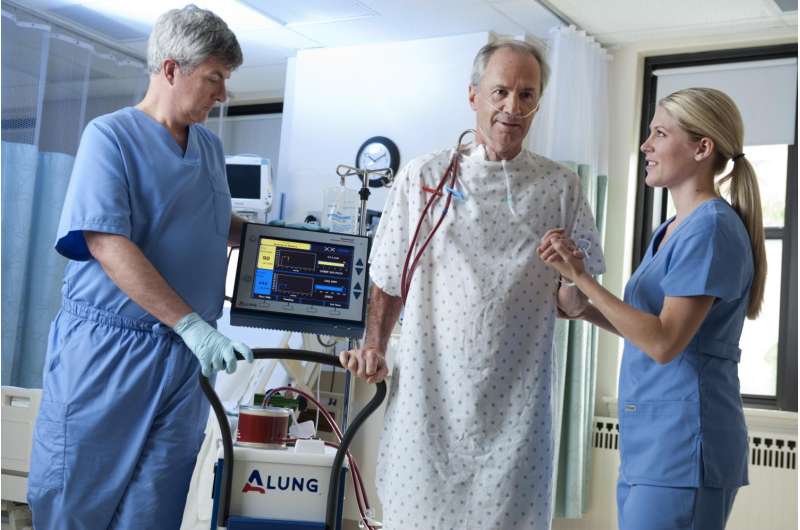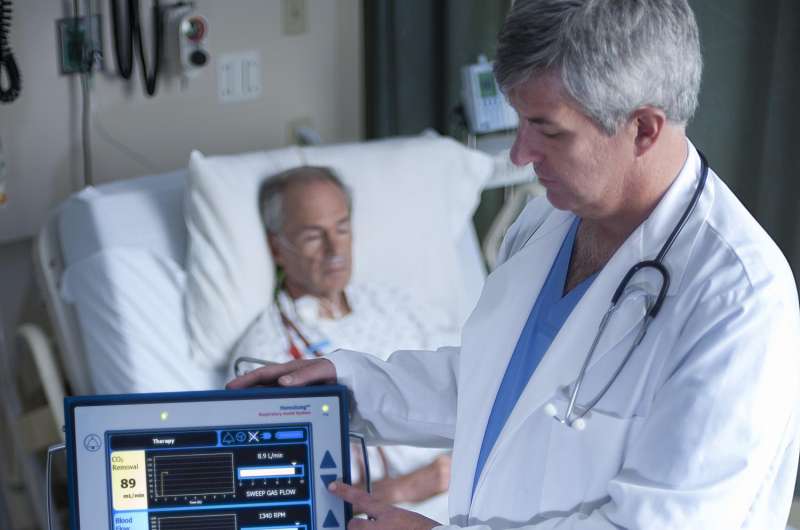Queen's University Belfast co-lead one of world's biggest trials in respiratory health

A new technology—'dialysis for the lungs'—which could save thousands of lives in Intensive Care Units is being taken forward by researchers at Queen's University Belfast in one of the biggest clinical trials in the world in the area of respiratory failure.
Queen's researchers and Belfast Health and Social Care Trust are co-leading the landmark trial involving 1,120 critically ill patients in 40 different hospital sites across the UK over the next four years.
Recruited patients will test the effectiveness of a new procedure designed to alleviate the pressure put on the lungs by mechanical ventilation—or 'ventilators'. Researchers believe the new procedure—which removes carbon dioxide from the blood in a process similar to kidney dialysis—can significantly improve survival rates in people suffering respiratory failure but only a full trial will provide evidence.
Respiratory failure is common in the UK; about 100,000 people each year require ventilators and up to 40% of these patients ultimately die. In Northern Ireland, around 600 people require ventilators with approximately 240 deaths. The number of deaths exceeds that from road traffic accidents or from common cancers such as prostate cancer.
Although ventilators save lives, they are also linked with damage to the lungs, because of the pressure exerted. The new technology being trialled by Queen's and Belfast Trust is called 'extracorporeal carbon dioxide removal' and allows for a gentler ventilation.
Queen's and Belfast Trust medics completed a pilot trial last year, across 10 UK sites, which demonstrated that the procedure was safe and did facilitate gentler ventilation. The full trial will concentrate on how significantly it can impact mortality rates.
Professor Danny McAuley, Professor of Intensive Care Medicine at the Wellcome-Wolfson Institute for Experimental Medicine at Queen's University Belfast, explained: "A mechanical ventilator acts like bellows as air is forced into the lungs under pressure. If the pressure is too high, this can cause lasting damage.
"These new devices, however, have been designed to help remove carbon dioxide from the patient's blood - in a process quite similar to kidney dialysis—which is one of the main functions of the lungs. By temporarily removing this function from the lungs, it means lungs do not have to work quite as hard, so a gentler ventilation should be sufficient.
"Recent National Institute for Health and Care Excellence (NICE) guidelines have encouraged clinicians in the UK to recruit patients to our trial which is a great endorsement of what we are doing here at Queen's."
Dr James McNamee, from Belfast Health and Social Care Trust said: "In our study, there will be two groups of people admitted to ICUs with respiratory failure. One will receive the best level of care within current NHS guidelines while the other group will have the additional, new treatment to artificially remove the carbon dioxide from their blood. At the end, we should know whether the new technology can significantly impact on mortality rates."
The extracorporeal CO2 removal device to be used in the study, called the Hemolung Respiratory Assist System, is manufactured by US-based ALung Technologies. Peter DeComo, Chief Executive Officer of ALung said: "We are excited to see the study proceed from the pilot to pivotal stage. We applaud Professor McAuley and his team for their efforts and obtainment of this important milestone."

The £2.1million research project, including the pilot trial, is being funded by the National Institute for Health Research (NIHR) Health Technology Assessment Programme.
Dr Janice Bailie, Assistant Director of the Public Health Agency's Health and Social Care R&D Division in Northern Ireland, which has provided long-term support to help the Northern Ireland team secure the award said: "I am delighted that Northern Ireland will lead this UK-wide research study that has the potential to improve the management of patients in critical care worldwide.
"The prestigious National Institute for Health Research offers the opportunity for local researchers like Professor McAuley and his team to bring major research income to Northern Ireland, to support this type of study. The results of this study will be of interest at an international level and will highlight the capability of Northern Ireland researchers to lead globally significant healthcare research".















